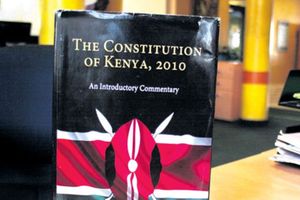
Anti-government protesters use a police shield to protect themselves from tear gas canisters on Tom Mboya Street in Nairobi on July 2, 2024.
Both the government and opposition are struggling to understand and explain the Gen Z revolution. So far, I have come across three theories of what and why it is happening. Theory one is that this is a genuine arousing of a national patriotic consciousness.
Theory two blames a foreign hand, and theory three is a variant, blaming the IMF. We shall examine each briefly. But first, how did the regime react to the ongoing protests?
The early reactions were to dismiss and discount. Regime apologists, in their characteristic self-importance and arrogance, called the Gen Z a confused, KFC-eating, uber-riding lot. A silly insult, my son told me. Fast food and taxi-hailing are a regular part of modern life. But it was calling them criminals that inflamed the revolutionary spirit.
The sacking of Parliament on the first Super Tuesday brought shock and disbelief. Anger against MPs is fairly common. Frequently labelled mpigs, more than 60 per cent are usually sent packing at every general election. Demonstrations outside parliament are not new. But never at this scale. And parliament has never been sacked before!
Punishment
Then came fear. At the nationwide character of the revolution, and the specific meting out of punishment. Citizens are angry. They are chanting “Ruto must go”, a clear sign that they are fed up with the wasteful, extravagant and tone-deaf Executive. But they are also specific to their MPs. Those who voted yes for the now discarded Finance Bill dare not go to their constituencies. Never before has accountability been so individual and direct. At least a dozen MPs are facing recall.
As the initial shock wears down, theories are emerging as the political class, analysts and academicians try to comprehend what is going on.
Theory one interprets this as a genuine revolutionary moment. And none better than the Gen Z to lead it. The nation can no longer endure a political culture based on tribalism and corruption, that uses our taxes for personal purposes. The older folks have been part and parcel of this rot, or at the very least, complicit. They can’t change it. It is up to the less tainted, young people. The Pope’s representative in Kenya was an early notable voice to acknowledge the revolution.
Theory two suspects a foreign hand. Proponents argue that the sheer scale of the protests, the level of organization and coordination is not organic. They point to the multiple personality nature of the regime’s foreign policy as a possible cause. I disagree with this school. Economists recognise the wisdom of the crowd. When you ask many people to estimate the weight of an individual, the estimates will very closely approximate the real value. Online technology makes it easier to find information, analyse the problem, and determine a course of action.
Tongue in cheek, the video of Putin supposedly congratulating Gen Zs circulating the last two days, will only fuel speculation. Maintain a sense of humour and remember that this is the age of disinformation. Humour, sometimes morbid, is part of the arsenal in this revolution.
You did see, did you not, the wildly popular tweet that Gen Z had selected Jacob Juma as their representative to the now still-born multi-sectoral talks! The point is that Mr Juma is long dead and so are the talks.
Theory three is a variant of the foreign hand and blames the IMF. This theory is quite fashionable, particularly after it emerged that IMF reports usually assess the risk of anti-tax protests. They knew that the finance bill would be unpopular, but forced it anyway, which is a central narrative of this theory.
The theory is farfetched. I don’t hold ba rief for the IMF. Still, I should own up to having worked for the International Finance Corporation, the private sector arm of the World Bank Group earlier in my career.
The International Monetary Fund (IMF) is the equivalent of an intensive care unit. Purpose-built to assist economies in difficulties. By the time a regime is borrowing from them, your economy is in trouble. Often the trouble is self-inflicted. The medicine is bitter, but it is not the cause of your mismanagement.
Sh1 trillion
In the Kenyan case, it is the current regime’s increase of expenditure by more than Sh1 trillion in just eighteen months, that is at the heart of the problem. That regimes before it may have also run the economy poorly is no excuse.
To partly finance this increase, the KK regime increased taxes by Sh350 billion last year and wanted a similar increase this year. In fact, their so-called “plan” is to continue this trajectory for the next four years!
But the sluggish economy cannot generate that amount of tax increase. The regime has, therefore, continued to borrow heavily. To attract money to itself, they offer very high interest rates, out-competing the private sector in the credit market. With consumers and the private sector starved of credit, the economy continues to underperform. Quarter one growth is 5 per cent, down from 5.5 per cent last year.
Except for the brazen stealing, waste and corruption, you will be hard-pressed to show the results of all this spending. The cost of living continues to escalate, respite coming only in lower food costs, the result of unusually heavy rains. It is to this spending that the citizens have said a loud no!
A lot of reporting talks of austerity measures. I beg to differ. What Kenya needs is a balanced budget. That is a budget without a deficit. For a minimum of three years. That will get the government out of the domestic credit market, allowing the economy to expand based on private-sector production and private consumption.
For that to happen the government must live within its means, and eliminate waste and corruption.
@NdirituMuriithi is an economist













